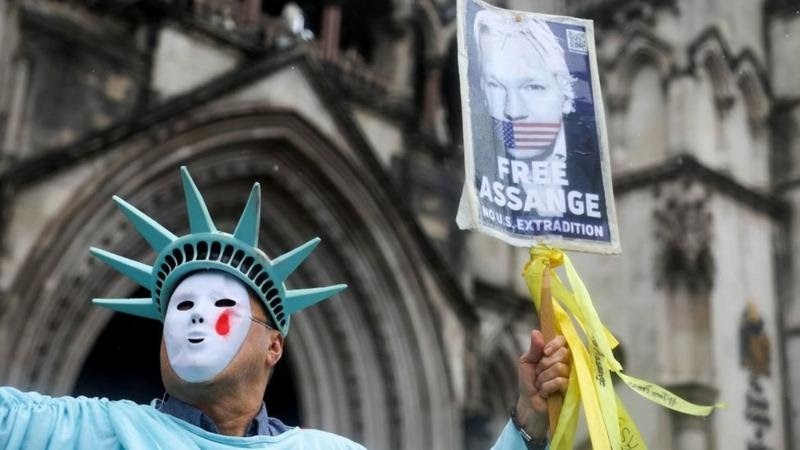
Julian Assange "put lives at risk" by releasing classified US documents and should be extradited to face justice, a High Court hearing has been told.
Lawyers for the US said Mr Assange revealed the names of sources when he used Wikileaks to release unredacted files on the Afghanistan and Iraq wars.
The hearing is the latest in his five-year battle to fight extradition.
On Tuesday his lawyers said the US case was "state retaliation" and therefore extradition would be against UK law.
If his appeal is turned down, Mr Assange, 52, could be extradited within weeks.
The US legal team told the court that Mr Assange faces allegations he encouraged and assisted Chelsea Manning, a US intelligence analyst, in obtaining around 400,000 Iraq war-related activity reports and 250,000 US State Department cables.
Many were published unredacted through WikiLeaks.
Clair Dobbin KC said the plans to extradite and prosecute Mr Assange, who founded Wikileaks, were based on his alleged actions, not his political opinions.
She said there were "profound consequences", with some of the named sources in the documents, who had provided information to the US, facing arrest, the loss of assets, threats and harassment.
"This wasn't a slip, or an error, this was the publication of a vast amount of material unredacted," Ms Dobbin told the hearing.
In written submissions, Ms Dobbin and James Lewis KC described the leak as "one of the largest compromises of classified information in the history of the United States."
"It is specifically alleged against the appellant that by publishing this information on the WikiLeaks website, he created a grave and imminent risk that the human sources named therein would suffer serious physical harm."
Ms Dobbin said: "The administration in the US of course changed during these proceedings... but nonetheless the prosecution of the appellant remains in foot. Because it is based on law and evidence, not political inspiration."
The arguments are the latest attempt by Australian Mr Assange to fight his extradition to the US.
He has been in Belmarsh prison in London since his arrest in 2019 at the request of US authorities.
In a January 2021 ruling, a district judge said that Mr Assange should not be sent to the US, citing a real and "oppressive" risk of suicide.
However, the judge ruled against him on all other issues, including the argument that he was acting as a journalist.
Later that year, the US authorities won a High Court bid to overturn that decision, paving the way for extradition to face conspiracy charges.
The latest hearing has been brought by Mr Assange, who is now asking for the right to challenge the original judge's dismissal of other parts of his case.
Ms Dobbin said on Tuesday, the first day of the hearing, that the original judge "rejected outright" that Mr Assange should be treated like a journalist "or what he did could fall under the ambit of responsible journalism."
Political motivations'
Mark Summers KC argued on Tuesday that the US prosecution of Mr Assange would be retribution for his political opinions, meaning it would be unlawful to extradite him under UK law.
He said: "This is a paradigm example of state retaliation for the expression of political opinion. The district judge did not address it - had she done so, it would have been fatal to her decision."
Mr Summers later told the court that the US authorities had allegedly developed a "breath-taking" plan to either kill or kidnap Mr Assange while he was in the Ecuadorian embassy, where he remained for around seven years.
The barrister later said the plan "only fell apart when the UK authorities weren't very keen on the thought of rendition, or a shootout, in the streets of London".
Edward Fitzgerald KC, also for Mr Assange, later said he is being prosecuted for an "ordinary journalistic practice".
The hearing ended on Wednesday with the judges saying they will rule later. Their judgement is not expected before mid-March, based on timelines indicated in court.
If Mr Assange is refused permission to appeal, his only opportunity to avoid being sent to the US is to ask the European Court of Human Rights to stop the flight.
If he wins permission, he will remain in jail while that case is prepared for later in the year.(BBC)

